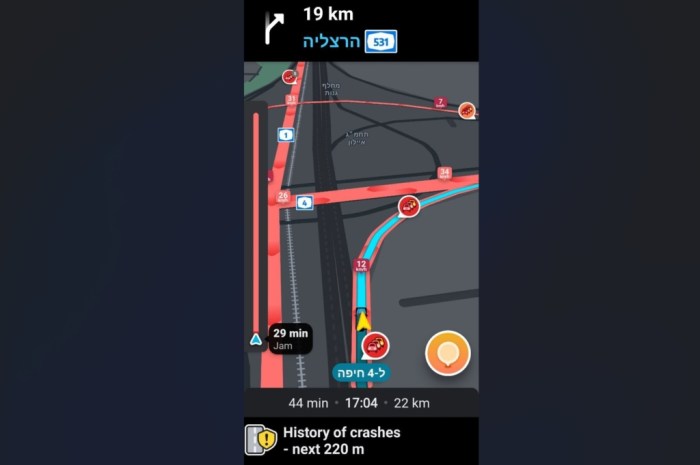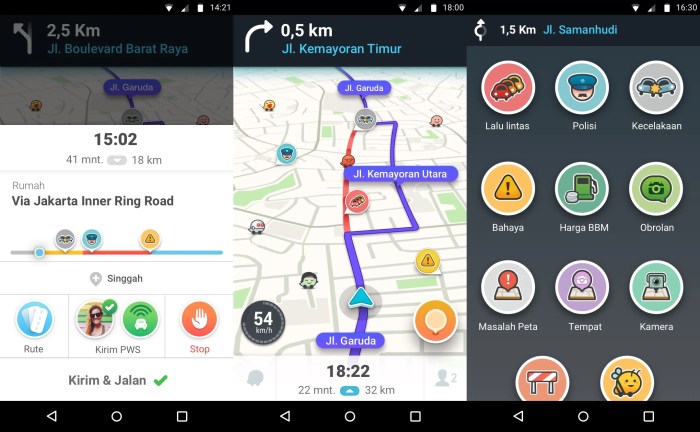Waze crash history alerts are a game-changer for drivers, providing real-time insights into potential hazards on the road. By leveraging user-submitted data, Waze creates a network of awareness, alerting drivers to past crash locations and helping them navigate safely.
This system works by collecting information from users who report accidents, road closures, and other incidents. This data is then analyzed to identify areas with a higher risk of accidents, and Waze generates alerts to warn drivers about these potential hazards.
Alerts and Notifications
Waze’s crash history alerts are a vital feature that leverages data to enhance driver safety. By analyzing past crash locations, Waze can proactively warn drivers of potential hazards, helping them navigate roads more safely and avoid accidents.
Crash History Alerts
Waze uses crash history data to generate alerts, informing drivers about areas where accidents have occurred frequently in the past. These alerts are displayed on the Waze map as hazard icons, often accompanied by a brief description of the potential danger. This information helps drivers be more cautious and aware of potential hazards in their surroundings.
- Example 1: A Waze alert might indicate a high accident rate on a particular road segment due to a sharp curve or a blind intersection. Drivers are then alerted to exercise caution and adjust their speed accordingly.
- Example 2: Another alert might warn drivers of a stretch of road known for frequent rear-end collisions. This could be due to heavy traffic, a sudden stop, or other factors. By providing this information, Waze helps drivers anticipate potential hazards and react proactively.
How Waze Uses Crash History Data
Waze utilizes crowd-sourced data to generate crash history alerts. Users can report accidents and other incidents directly through the Waze app. This information is then aggregated and analyzed by Waze’s algorithms to identify areas with a high concentration of crashes. Based on this analysis, Waze generates alerts to inform drivers about potential hazards.
Benefits of Crash History Alerts
Receiving crash history alerts offers several benefits for drivers, including:
- Increased Awareness: Alerts make drivers more aware of potential hazards in their surroundings, enabling them to take precautions and adjust their driving behavior accordingly.
- Proactive Driving: Crash history alerts encourage proactive driving by providing drivers with advance notice of potential dangers. This allows them to adjust their speed, maintain a safe distance from other vehicles, and anticipate potential hazards.
- Reduced Risk of Accidents: By promoting safer driving practices and raising awareness of potential hazards, crash history alerts contribute to a reduction in the risk of accidents.
- Improved Traffic Flow: By alerting drivers to areas with a high accident rate, Waze can help mitigate traffic congestion and improve overall traffic flow.
User Experience
Waze crash history alerts, a feature that notifies drivers about past accidents on their route, have a significant impact on user behavior and potentially on road safety. By providing this information, Waze aims to encourage drivers to be more cautious and aware of potential hazards on the road.
Impact on User Behavior
The impact of crash history alerts on user behavior can be observed in several ways.
- Increased Awareness: Drivers are more likely to be aware of potential danger zones on their route, prompting them to be more vigilant and adjust their driving accordingly.
- Reduced Speed: The knowledge of past accidents may encourage drivers to reduce their speed, especially in areas known for accidents. This can contribute to a safer driving environment.
- Route Adjustments: Drivers might choose to avoid routes with a high frequency of accidents, opting for alternative routes perceived as safer.
Effectiveness in Preventing Accidents
While the effectiveness of crash history alerts in preventing accidents is difficult to quantify definitively, several studies and anecdotal evidence suggest potential benefits.
- Research conducted by the University of California, Berkeley, indicated that areas with high crash history alerts experienced a slight decrease in accident frequency.
- User feedback on online forums and social media platforms suggests that drivers feel more prepared and cautious when alerted about past accidents, potentially leading to safer driving habits.
User Feedback on Accuracy and Usefulness
User feedback on the accuracy and usefulness of crash history alerts is generally positive.
- Users appreciate the information provided, finding it helpful in making informed driving decisions.
- However, some users express concerns about the accuracy of the data, suggesting that the alerts might not always reflect the current situation.
- Other users point out that the alerts might not always be relevant to their driving situation, such as when driving on a highway with minimal traffic.
Data Privacy and Security
Waze, like any app that collects user data, has a responsibility to protect user privacy and ensure the security of the information it gathers. The app’s crash history data, while valuable for improving road safety, also raises potential privacy concerns. Understanding Waze’s policies regarding data collection, usage, and security measures is crucial for users to make informed decisions about their privacy.
Data Collection and Usage Policies
Waze’s data collection and usage policies are Artikeld in its Privacy Policy. The app collects various types of data, including location data, driving habits, and crash reports. Waze uses this data to provide its core services, such as real-time navigation, traffic updates, and hazard alerts.
- Crash data, specifically, is used to create and update hazard alerts, improve route planning, and identify areas with a higher risk of accidents.
- This data is anonymized and aggregated, meaning individual users are not identifiable in the data used for these purposes.
Waze emphasizes that it does not share user data with third parties for advertising or other commercial purposes without user consent.
Potential Privacy Concerns, Waze crash history alerts
While Waze anonymizes and aggregates crash data, some potential privacy concerns remain.
- Even with anonymization, there is a possibility of re-identification, where an individual user could be identified based on the combination of their location data, driving habits, and crash reports.
- The potential for data breaches and unauthorized access to crash history data is another concern.
These concerns highlight the importance of robust security measures to protect user data.
Data Security Measures
Waze implements various measures to protect user data and mitigate potential privacy risks.
- The app uses encryption to secure data transmitted between users and Waze servers.
- Waze also employs access control measures to restrict access to sensitive data to authorized personnel.
- Regular security audits and vulnerability assessments are conducted to identify and address potential security weaknesses.
These measures aim to ensure the confidentiality, integrity, and availability of user data.
Impact on Road Safety: Waze Crash History Alerts
Waze crash history alerts, a feature that notifies drivers about past accidents in a particular area, hold the potential to significantly enhance road safety. By providing drivers with real-time insights into accident-prone zones, Waze aims to encourage proactive driving behaviors and reduce the likelihood of future crashes.
Utilizing Crash History Data for Enhanced Road Safety
Waze crash history data can be a valuable resource for improving road safety measures. This data can be analyzed to identify specific locations with high accident rates, enabling authorities to implement targeted interventions.
- Improved Infrastructure: Analyzing crash data can pinpoint areas where infrastructure improvements are needed. This could include adding traffic lights, improving road markings, or widening roads to enhance visibility and reduce congestion.
- Enhanced Traffic Enforcement: High-accident areas can be targeted for increased traffic enforcement, focusing on speeding, distracted driving, and other common contributing factors to crashes.
- Public Awareness Campaigns: Data insights can be used to create tailored public awareness campaigns, educating drivers about specific road hazards and promoting safe driving practices in those areas.
Future Developments
The future of Waze crash history alerts is bright, with advancements in technology promising to enhance their accuracy, effectiveness, and overall impact on road safety. By leveraging emerging technologies, Waze can refine its crash history alerts, making them even more valuable for drivers and contributing to safer roads.
Integration with Advanced Driver-Assistance Systems (ADAS)
The integration of Waze crash history alerts with ADAS systems in vehicles presents a significant opportunity for enhancing road safety. ADAS features, such as lane departure warning, automatic emergency braking, and adaptive cruise control, can be enhanced by incorporating real-time crash history data. By providing drivers with proactive warnings about potential hazards based on past incidents, ADAS systems can intervene earlier, reducing the risk of accidents. For example, if Waze detects a history of rear-end collisions at a specific intersection, the ADAS system can alert the driver to slow down or maintain a safe distance, potentially preventing a crash.
Real-Time Data Analysis and Machine Learning
The use of real-time data analysis and machine learning algorithms can significantly improve the accuracy and effectiveness of crash history alerts. By analyzing vast amounts of data from various sources, including traffic patterns, weather conditions, and driver behavior, Waze can identify emerging trends and patterns that contribute to accidents. This information can be used to refine crash history alerts, providing drivers with more targeted and timely warnings. For example, by analyzing data from past accidents, Waze can identify specific road segments with a high incidence of crashes during rush hour. This information can be used to trigger more prominent alerts during those times, increasing driver awareness and reducing the risk of accidents.
Enhanced Data Visualization and User Interface
The way crash history alerts are presented to users can significantly impact their effectiveness. Future developments in data visualization and user interface design can make alerts more intuitive and engaging, enhancing driver understanding and awareness. For example, Waze could implement interactive maps that visually highlight areas with a high incidence of accidents, allowing drivers to easily identify potential hazards. Additionally, alerts could be tailored to specific user preferences, providing relevant information in a way that is easily understood and acted upon.
Collaboration with Government Agencies and Emergency Services
Collaboration with government agencies and emergency services can further enhance the impact of Waze crash history alerts. By sharing data on accident locations and severity, Waze can contribute to a more comprehensive understanding of road safety issues. This information can be used to prioritize road improvements, allocate resources effectively, and implement targeted safety campaigns. Additionally, real-time crash history alerts can be integrated into emergency response systems, enabling faster dispatch of first responders and potentially saving lives.
Waze crash history alerts are a powerful tool for promoting road safety. By providing drivers with real-time information about potential hazards, these alerts can help prevent accidents and save lives. As technology continues to evolve, we can expect to see even more innovative and effective ways to use crash history data to improve road safety.
Waze crash history alerts can be a lifesaver, especially if you’re driving through a notorious accident-prone area. But as companies like Waze beef up their security, the price of zero-day exploits, those hidden vulnerabilities hackers use to infiltrate systems, is rising. This means that the cost of exploiting weaknesses in apps like Waze is going up , making it harder for malicious actors to get their hands on sensitive data.
So, while you might not be able to avoid all crashes, you can at least rest assured that your driving data is more secure.
 Standi Techno News
Standi Techno News

